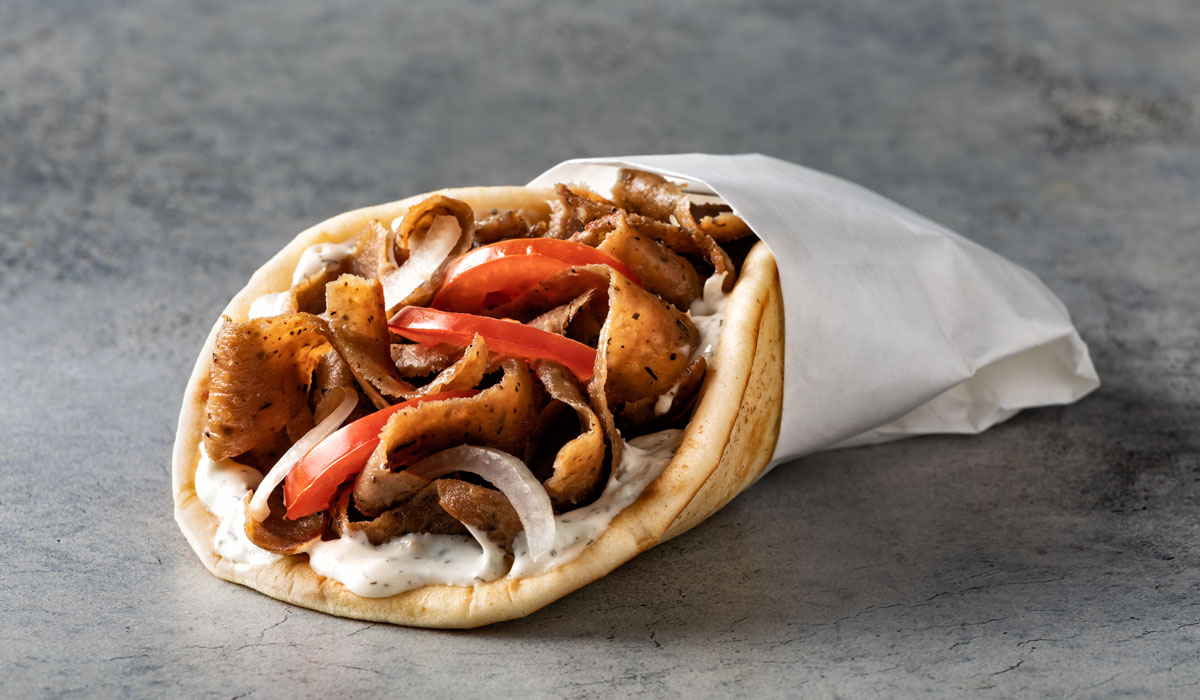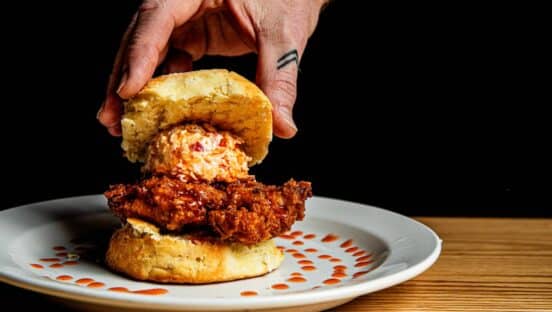The Gyro Shack’s journey began with founder Gus Zaharioudakis in 2010, who started with a food truck and two double drive-thru restaurants in former coffee shops.
As president Seth Brink explains, Zaharioudakis knew much about food and created all the recipes. Although he wasn’t as much of a business-minded person, he pushed the brand through the first few critical years, until Brink and Doug Miller purchased the company in 2015. Equipped with franchise and operational experience, Miller and Brink built the FDD, operations documents, and franchisee training manuals.
Five years later, Brink says the nine-unit Gyro Shack is now prepared for its third and most pivotal chapter—one that will see the brand aggressively expand its franchising across multiple states in the next couple of years.
“We’re not a new brand,” Brink says. “We’ve been around for 10 years. We know what our operations look like,” Brink says. “… I think being a drive-thru model, we’re primed to go into new markets and be successful.”
The growth will be driven by serial entrepreneurs Mark Urness and Matt Jeffries, who recently purchased the Gyro Shack after running four stores and working as one of the company’s first multi-unit franchisees.
The company is building a more comprehensive budget and investing in site analytics for franchise sales and in public relations for brand awareness. It’s also boosting its tech infrastructure as COVID continues to push the industry toward that model.
The brand’s franchise expansion plans are focused on single-unit and multi-unit deals in Arizona, Utah, Idaho, Nevada, Montana, New Mexico, Colorado, and Wyoming. The plan is to open one to two more stores this year—if COVID allows for the right real estate—and then four to six stores in 2021 and 10 to 12 in 2022.
In partnership with Brink, Urness and Jeffries are now leading that charge.
“They bring a completely different level of expertise,” Brink says.
In 1994, Urness started cell phone brand Mybullfrog.com and grew the brand to more than 120 locations. In 2015, the company merged with Go Wireless, a retail store and service center with 700-plus units.
“He’s really good at the visionary, guerrilla marketing type of input for us,” Brink says. “And driving the brand in Mark’s mind, it’s always about getting more people into the stores to try our food, and how can we get them in and out quickly, reinforcing our core values—good food at a fast pace.”
Meanwhile, Jeffries has restaurant experience dating back more than 20 years. Brink notes the new co-owner brings a financial acumen that Gyro Shack has never had.
“He’s helping us build those budgets and going into these new markets with our eyes wide open financially so that we can make some responsible choices, and reining us in on where we need to spend our money and what we need to spend it on,” Brink says.
On the precipice of aggressive expansion, the Gyro Shack is performing well through the pandemic, Brink notes.
After an initial dip when COVID first hit in March, the brand has grown significantly thanks to its drive-thru. The channel has increased 50 percent while delivery has lifted 300 percent. Approximately 80 to 85 percent of orders are now delivery or drive-thru. Despite one location in a downtown area being closed, Comps and transactions are now positive for the year.
“We were built on that drive-thru foundation, and that has definitely fared well for us going through the pandemic.”
According to Yelp, nearly 16,000 restaurants have closed permanently due to COVID. While unfortunate, the mass closures present real estate opportunities for brands that survive the pandemic—something the Gyro Shack hopes to capitalize on with its franchise growth.
With customers gravitating more toward convenience, drive-thru will be a focus, but Brink says the brand has different models that allows for flexibility when searching for real estate.
“We’re not a large brand that is focused on, OK every location is going to be 2,000 square feet, it’s going to be the same dimensions, and it’s going to look exactly the same,” Brink says. “Although that’s nice, I think the flexibility in real estate is really going to help us. … Only looking for drive-thrus could be a disadvantage because way more brands are going to be looking for them. … But we are definitely focused on keeping that, and looking at our economics, the economics are just way better. Coming through the pandemic, it’s just solidified for me that having a drive-thru is well worth taking extra time to find the right real estate.”
Part of the expansion includes making the jump from Boise to Phoenix and planting a corporate store in the area. Brink says if the Gyro Shack doesn’t have any partners in Phoenix, the company will build stores to create a starting point and begin engaging customers.
Brink says the key to growing brand recognition in a new market is to build pods.
“You can’t just look and find a location in a Phoenix and build a store and expect people to come,” he says. “Although visibility and traffic certainly play a large role in those markets, I think that you need to look at a geographic area where you can put two to three stores and try to open those within a reasonable amount of time of one another so you can build that brand awareness in those areas and become top of mind for people who travel in those areas.”
The crux of the franchising strategy is to find franchisees who fit culturally—ones who are servant leaders, agree with the brand’s vision, and enjoy the menu.
Brink says the brand is focused on creating great food, but at a pace that is cognizant of the customer’s time. So it’s key that future partners are like-minded and understand that the customer is really the boss.
“I tell my people this all the time. When I come into the stores, I say, ‘Who’s the boss?’ And they always look at me and say, ‘Well you are of course,’” Brink says. “And I make them keep asking me that until they figure out that I want them to tell me that the customer is the boss. And then my managers, I do the same thing to get them to realize that OK, their customer is the boss, but also their employees are the boss too. How can we serve our employees and our customers to create this brand that is just culturally relevant and people not only come in to get the food, but to see the people? Because that’s what it’s all about.”




